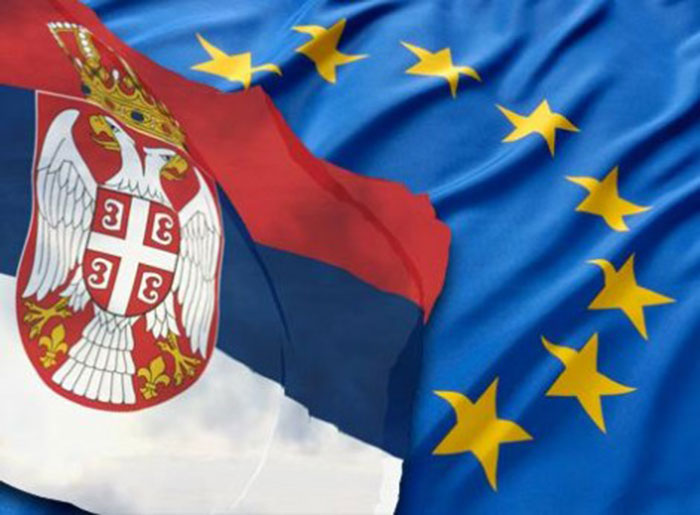The Stabilisation and Association Committee (SA Committee) held its second meeting following the entry into force of the Stabilisation and Association Agreement (SAA) between the EU and Serbia on 1 September 2013. Representatives of the Republic of Serbia and of the European Commission reviewed the implementation of the Copenhagen EU accession criteria and the implementation of the SAA. The fruitful exchanges allowed for the reviewing of key reforms which are being pursued first and foremost for the benefit of the citizens of Serbia.
This second meeting was co-chaired by Ms. Ksenija Milenkovic, Acting Director of the Serbian European Integration Office (SEIO), and by Mr Jean-Eric Paquet, Director at Directorate General for Neighbourhood and Enlargement Negotiations of the European Commission.
The SA Committee reviewed the developments related to the fulfilment of the political criteria by Serbia. The SA Committee stressed the importance of consulting stakeholders in the legislative and accession process and the role of the Parliament in the oversight of the executive. It underlined the role of the Independent Regulatory Bodies and the importance of the effective follow-up of their findings. It welcomed progress made on public administration reform and discussed the reforms on local self-government in Serbia. It also stressed the importance of strengthening inclusive regional cooperation and Serbia’s progressive alignment with the EU’s foreign policy positions.
The SA Committee encouraged Serbia to ensure that the reform momentum in the area of the judiciary and rule of law is maintained. It welcomed the first steps taken in the implementation of the national strategies on judicial reform and the fight against corruption. It called on Serbia to address the significant challenges that remain regarding independence, impartiality, accountability, efficiency and access to justice. The SA Committee reiterated the particular importance it attaches to the development of a solid track record in the fight against corruption and organised crime.
The SA Committee welcomed the adoption of a comprehensive anti-discrimination strategy and underlined the importance of the protection of minorities, including the Roma and LGBTI. It underlined the necessity to finalise and adopt the related action plan. The SA Committee underlined those efforts towards economic and social inclusion of the Roma need to be stepped up. The SA Committee acknowledged Serbia’s efforts to fight irregular migration and encouraged further progress in this area. It notably highlighted the need to thoroughly rationalise the asylum procedure. It looked forward to receiving the action plans required for the opening of the rule of law chapters and recalled that they should be comprehensive, inclusive and backed by strong financial and monitoring mechanisms.
The SA Committee also reviewed the economic criteria. It noted the difficulties of the Serbian economy, which е experienced particular hardships in 2014. It welcomed the recent structural economic reforms such as the reform of the labour market or the launching of the restructuring and privatisation of a significant number of publicly owned companies. In view of the present economic situation, it concluded that structural reforms, in particular to improve the business environment, should be accelerated and amplified. The SA Committee took note of the fiscal consolidation measures adopted in 2014. It underlined that further efforts will be required to address the issue of the public deficit and debt, and in particular the overall amount of subsidies. The European Commission stressed it will assist Serbia in improving its economic governance. The recently concluded stand-by arrangement with the IMF is also expected to contribute to further economic reforms.
Regarding the implementation of the SAA, the SA Committee noted that the SAA, and the previous Interim Agreement on trade and trade related matters, had been implemented in a satisfactory manner. Overall, the liberalisation of trade brought about by these two agreements has contributed to the large increase of Serbian exports to the EU: over 70% between 2010 and 2014.
The SA Committee reviewed the state of play of the various areas covered by the SAA, and took note of the recent development in the area of trade, industry, customs and taxation, agriculture, internal market and competition, innovation information society and social policy, transport, environment and energy. The SAA Committee highlighted the areas where specific efforts are needed, such as the improvement of the control of State aid.
Finally, the SA Committee reviewed the extensive financial assistance provided by the EU to Serbia. The EU is committed to continue supporting Serbia’s EU accession process including financially. Since 2007, close to € 1.7 billion has been granted to support Serbia’s accession. Following the floods in May 2014, the EU already allocated €102 million of grants to support reconstruction and recovery efforts. Additional €60 million will be allocated in the coming month from the EU Solidarity Fund. Since 2000 the EU, together with its member states, has been by far the biggest donor with a contribution amounting to 75% of all donations received by Serbia.
Both parties agreed that the SA Committee will continue to play an important role in ensuring continuity of the stabilisation and association process and the proper implementation of the SAA commitments, as an important framework for the assessment of the accession process in general.




